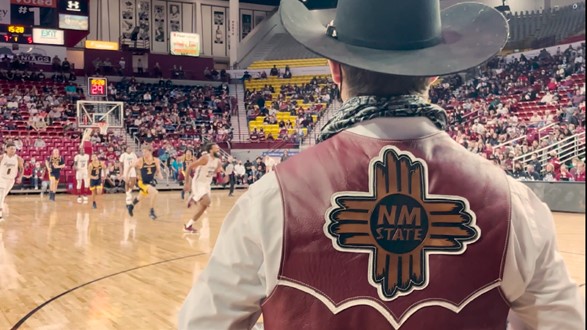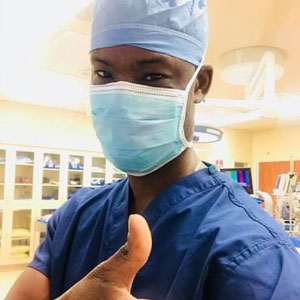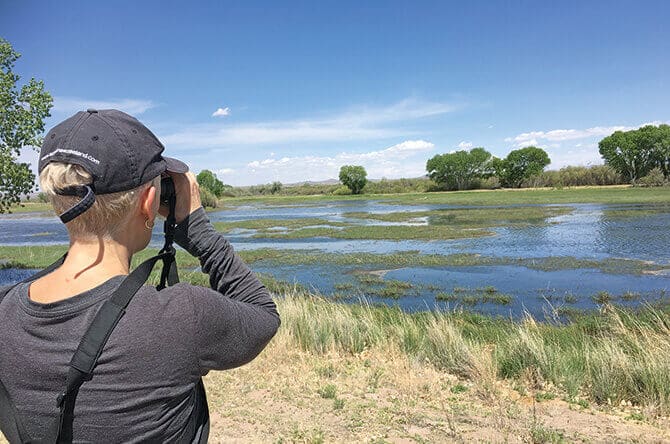When I went back to school for my first post-bachelor’s degree at age 31 and then a second two decades later, I had no idea that simply being older made me a non-traditional student.
According to Education Corner®, seven different categories of “non-traditional” college students exist: those older than 24, who received a GED instead of a high school diploma, have a child, are a single parent, waited at least a year after high school to start college, or are a first-generation student.
For Steve Minter, Chas Miller, and Tonya Suther, when it came to pursuing education, age was just a number.
Thirty-something Steve Minter of Knoxville, Tennessee, is a social media manager and event planner for a popular beer market. He finished his bachelor’s degree in journalism and mass communications at New Mexico State University (NMSU) at age 28, and several years later started a master’s program in elementary education at Western New Mexico University. A disastrous internship experience led him back to NMSU, and at press time he only had his comprehensive exam left to finish his master’s degree in communication studies.
Steve found one downside to being older was difficulty forging relationships with his fellow communication studies students, who were predominantly young women. Additionally, Steve said, “I had other responsibilities that made it hard to have the time to get to know anyone, plus I didn’t really have much in common with younger students.”
Based on his experience, Steve’s advice to someone considering entering a degree program as an older student is to know what you want to get out of a program and choose carefully. He notes, “Theory doesn’t get you a job, but hard skills pay off immediately.” He doesn’t regret his degree but says he “needed to work harder to find a job than those with a technical education. I really have had to forge my own path.” His final words of wisdom? If you start a program, “Do your reading and do the work. Don’t half-ass it.”

Chas Miller received a doctorate in astronomy from NMSU at 53. After 20 years as an engineer back East, Chas left his job to be a stay-at-home dad for his then-three-month-old son. At his wife Judy’s urging, he started volunteering at a community college planetarium, which sparked anew his long-time love of astronomy. Figuring he’d rather try and fail than never try at all, he applied to four doctoral programs and was accepted at NMSU.
Although the same age as some of his astronomy professors, Chas socialized with his student colleagues. “We had the same nerdy, Monty Python style sense of humor,” he chuckled, noting that his flowing white hair earned him the Tolkien-inspired nickname “White Wizard.” Academically, Chas said it was “delightful to realize I could hold my own.”
Chas notes that he was in a fortunate place that allowed him to pursue additional education solely for the learning experience. “Ultimately,” Chas said, “I didn’t find a job in astronomy, but I was still happy for the experience.” His advice to others is to make sure it makes financial sense, because going back to school is “disruptive and there are no guarantees.” Chas adds, “Make sure it’s something you really like to do, because otherwise you won’t make it. Think about what you want for yourself, and don’t worry if other people think it’s weird or doesn’t make sense.” That said, “as an older person you can’t be as carefree — listen to your gut if it puts up red flags.”
 Poet Tonya Suther received her bachelor’s degree from the University of Maryland in 2009 at age 44. Then a self-described “military wife,” she had heard the other wives talking about taking classes, and thought, “I can do that” — and so she did, over a period of nine years, starting in 2000 when her first child was in pre-K. An Air Force veteran herself, she used the GI bill to partially fund her studies.
Poet Tonya Suther received her bachelor’s degree from the University of Maryland in 2009 at age 44. Then a self-described “military wife,” she had heard the other wives talking about taking classes, and thought, “I can do that” — and so she did, over a period of nine years, starting in 2000 when her first child was in pre-K. An Air Force veteran herself, she used the GI bill to partially fund her studies.
Fast forward to 2017. Like many women do, Tonya had sacrificed her own wants to raise children, keep house, and be a helpmate to her husband. Finally, Tonya says, she had the opportunity “to do something just for me.” In her 50s, Tonya enrolled as a part-time student in the NMSU master’s program in English. At the time she was “too timid” to enroll in the Master of Fine Arts (MFA) program — but after her first year, she realized she absolutely had what it takes and moved to the MFA program in 2018.
Tonya says she feels fortunate to have had good professors but didn’t have much interaction with them. “They were my professors, not my friends,” she notes, “I was just there to do my work.” Her young “traditional” student colleagues fascinated her as she felt “they were nothing like I was at their age.” Although she thinks they are lucky to receive their education so young, she feels equally lucky having the wisdom of years guiding her to good choices.
Tonya plans to search for a writing residency or fellowship and has already submitted her first book of poetry to publishers for consideration. When asked what advice she’d give to someone older considering a degree program, she said, “Realize you have to put the work in. It takes focus. Really, I couldn’t have done it at [traditional students’] age. I tried community college right out of high school and quit because I wasn’t ready.” Her last piece of advice was the cheeky instruction her youngest daughter gave her: “Whatever you do, don’t talk about your kids in class!”
NMSU Assistant Professor Eric Magrane believes there are advantages to having older students in class. He says the geography department, for which he teaches, “welcomes non-traditional students! They often bring perspectives based on rich life experience. Their insights enliven discussions and raise the level of examination of the topic at hand.”
 Having been a first-generation and older student himself, Dr. Magrane has first-hand knowledge of the multiple challenges older students, especially first generation starting a bachelor’s program, may face. Navigating the “minutia of the academic space” can be daunting, and he suggests finding mentors willing to assist. He also suggests that students with competing responsibilities — perhaps caring for children, parents, or grandparents while working and taking classes — seek programs with options such as asynchronous online classes that allow students to learn on their own schedule. Finally, Dr. Magrane notes, “Reach out when you need guidance. Faculty members are there to help students succeed, not to be gatekeepers.”
Having been a first-generation and older student himself, Dr. Magrane has first-hand knowledge of the multiple challenges older students, especially first generation starting a bachelor’s program, may face. Navigating the “minutia of the academic space” can be daunting, and he suggests finding mentors willing to assist. He also suggests that students with competing responsibilities — perhaps caring for children, parents, or grandparents while working and taking classes — seek programs with options such as asynchronous online classes that allow students to learn on their own schedule. Finally, Dr. Magrane notes, “Reach out when you need guidance. Faculty members are there to help students succeed, not to be gatekeepers.”
University of Nebraska – Omaha Instructor Cheryl Maiorca was also a non-traditional student, enrolling in college at age 28. Shortly thereafter, she and her husband found they were expecting their first child, and she finished both her bachelor’s and master’s degrees online.
Dr. Maiorca says she’s had “both great and really flaky” older students in her classes. She recalls how she herself had to learn to budget time, money, and set priorities while juggling parenting duties and schoolwork. She isn’t sure that older students are either better or worse off than their younger counterparts, but they have different needs, especially when the “little people factor” is involved. Whether you are a single parent or have a dual-parent or multi-generation household, children add a layer of complexity to managing your degree program.
That said, older students who have been in the workforce usually understand scheduling to accommodate what needs to get done, which helps them succeed. Dr. Maiorca notes, “If students have been responsible to an employer, they’ll be responsible to me.” She continues, “As faculty, I need to meet students where they are and help them find tools to manage the individual challenges they face while ensuring they have the basic skills they need. I can show them the door leading to success — but they need to walk through.”
Written by Elaine Stachera Simon
Courtesy photos
Originally published in Neighbors magazine.
Posted by LasCruces.com















